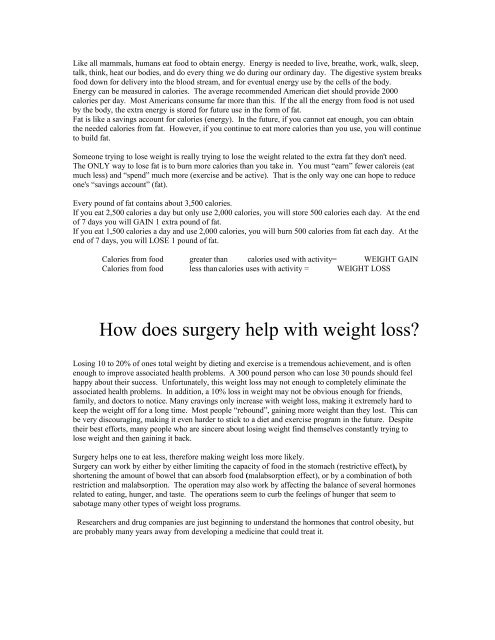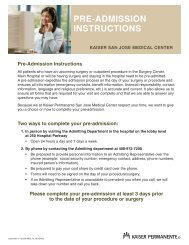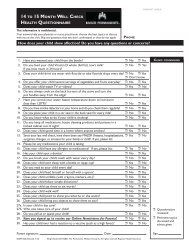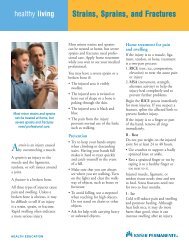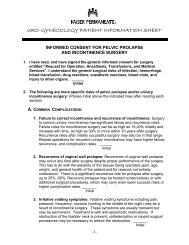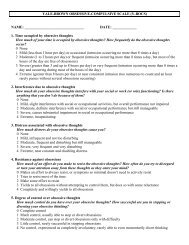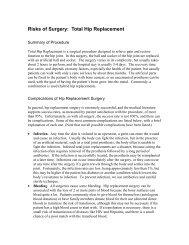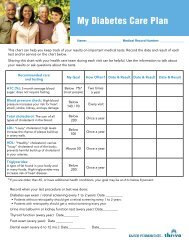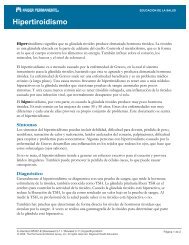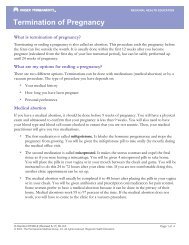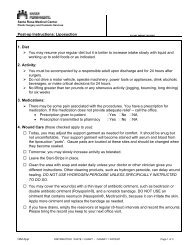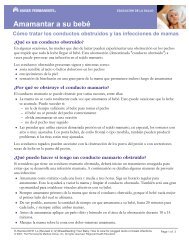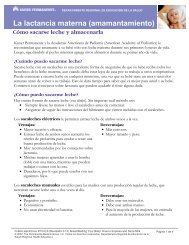Patient Information Book For Gastric Bypass Surgery - permanente.net
Patient Information Book For Gastric Bypass Surgery - permanente.net
Patient Information Book For Gastric Bypass Surgery - permanente.net
Create successful ePaper yourself
Turn your PDF publications into a flip-book with our unique Google optimized e-Paper software.
Like all mammals, humans eat food to obtain energy. Energy is needed to live, breathe, work, walk, sleep,<br />
talk, think, heat our bodies, and do every thing we do during our ordinary day. The digestive system breaks<br />
food down for delivery into the blood stream, and for eventual energy use by the cells of the body.<br />
Energy can be measured in calories. The average recommended American diet should provide 2000<br />
calories per day. Most Americans consume far more than this. If the all the energy from food is not used<br />
by the body, the extra energy is stored for future use in the form of fat.<br />
Fat is like a savings account for calories (energy). In the future, if you cannot eat enough, you can obtain<br />
the needed calories from fat. However, if you continue to eat more calories than you use, you will continue<br />
to build fat.<br />
Someone trying to lose weight is really trying to lose the weight related to the extra fat they don't need.<br />
The ONLY way to lose fat is to burn more calories than you take in. You must “earn” fewer caloreis (eat<br />
much less) and “spend” much more (exercise and be active). That is the only way one can hope to reduce<br />
one's “savings account” (fat).<br />
Every pound of fat contains about 3,500 calories.<br />
If you eat 2,500 calories a day but only use 2,000 calories, you will store 500 calories each day. At the end<br />
of 7 days you will GAIN 1 extra pound of fat.<br />
If you eat 1,500 calories a day and use 2,000 calories, you will burn 500 calories from fat each day. At the<br />
end of 7 days, you will LOSE 1 pound of fat.<br />
Calories from food greater than calories used with activity= WEIGHT GAIN<br />
Calories from food less than calories uses with activity = WEIGHT LOSS<br />
How does surgery help with weight loss?<br />
Losing 10 to 20% of ones total weight by dieting and exercise is a tremendous achievement, and is often<br />
enough to improve associated health problems. A 300 pound person who can lose 30 pounds should feel<br />
happy about their success. Unfortunately, this weight loss may not enough to completely eliminate the<br />
associated health problems. In addition, a 10% loss in weight may not be obvious enough for friends,<br />
family, and doctors to notice. Many cravings only increase with weight loss, making it extremely hard to<br />
keep the weight off for a long time. Most people “rebound”, gaining more weight than they lost. This can<br />
be very discouraging, making it even harder to stick to a diet and exercise program in the future. Despite<br />
their best efforts, many people who are sincere about losing weight find themselves constantly trying to<br />
lose weight and then gaining it back.<br />
<strong>Surgery</strong> helps one to eat less, therefore making weight loss more likely.<br />
<strong>Surgery</strong> can work by either by either limiting the capacity of food in the stomach (restrictive effect), by<br />
shortening the amount of bowel that can absorb food (malabsorption effect), or by a combination of both<br />
restriction and malabsorption. The operation may also work by affecting the balance of several hormones<br />
related to eating, hunger, and taste. The operations seem to curb the feelings of hunger that seem to<br />
sabotage many other types of weight loss programs.<br />
Researchers and drug companies are just beginning to understand the hormones that control obesity, but<br />
are probably many years away from developing a medicine that could treat it.


